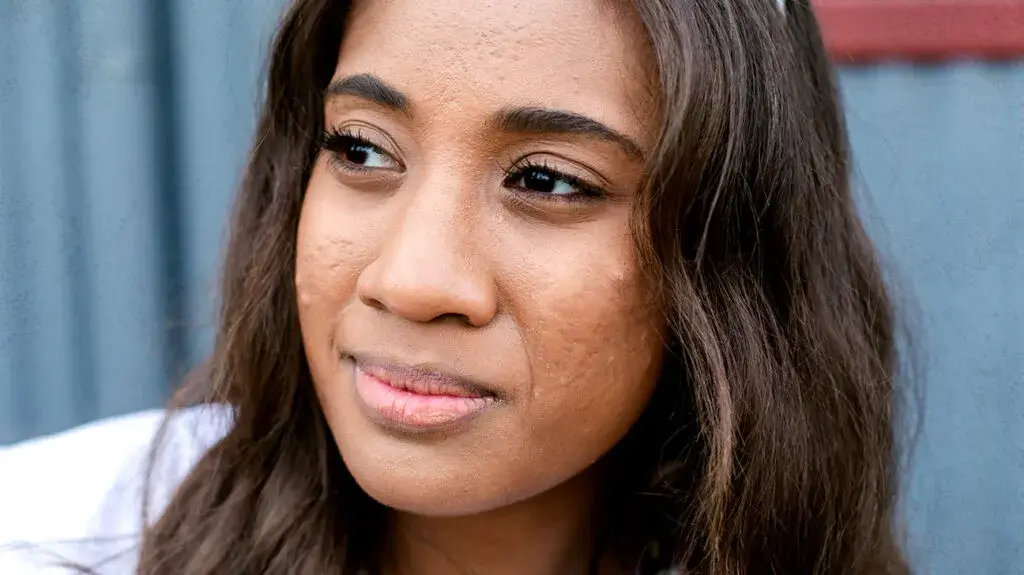Are you an aspiring model, actor, or Instagram star? Then you probably know that good skin is essential in the image-conscious world of show business. But why does your skin look so bad on camera?
If you’re not a professional makeup artist, making your skin look flawless on camera can be tricky. The lighting will be completely different from natural indoor light, and the illumination will probably be far harsher than anything you’re used to seeing regularly.
This article will go through some frequently asked questions about this topic, and also, we have some solutions that you will definitely implement to look good on camera.
Let’s get into it!
Table of Contents
Why does my acne look worse on camera?

The main reason acne looks worse on camera is that the skin will look much paler than usual. Actually, the cameras work in this way.
It produces a blue light that makes your skin look pale against a black background, making blemishes and redness stand out even more.
There are two ways in which you can get around this problem.
- To begin with, apply makeup that enhances your original skin tone.
- Alternatively, you can ensure that the makeup you wear is designed to match the unnatural blue light of the camera.
There are loads of products designed for people in the public eye, including foundations, concealers, and powders that come in special shades to suit the blue light of the camera.
It is essential to check the description of a product when choosing one to ensure the product is designed for cameras.
Why does my face look different on camera?
Your face will look different on camera for a couple of different reasons. If you have oily skin, the camera will bring out this quality, making your face look much shinier than it usually does.
This, in turn, will make your skin look much paler, which will make any imperfections, such as acne and redness, stand out even more.
If you have dry skin, on the other hand, the camera will make it look much shinier, which will make your face look darker. It may also make your jawline look more prominent, making your face wider.
Moreover, on a camera, freckles and moles will be much more visible than they would be if the light in your room was normal.
Why do my dark circles look worse on camera?

If you have dark circles under your eyes, these will be much more visible against the blue light of the camera than they would be against regular indoor lighting.
Makeup is the best way to conceal dark circles. Many products are designed for this, but some of the best ones contain pea-sized amounts of green and gray pigments that cancel out the redness in dark circles.
Avoid using heavy concealers under your eyes in front of the camera.
Instead, opt for a light coverage concealer that can be mixed with foundation to create a flawless finish.
Why does my camera make me look worse?
If your skin is naturally pale and you have a lot of redness on your face, the camera will make this redness stand out even more. This will make your skin look paler and make your imperfections look even more apparent.
Suppose you have a lot of dark shadows or discoloration. In that case, the camera will likely make your face look much darker, making your skin look paler and making your imperfections even more noticeable.
The camera will make this quality stand out even more if your skin is naturally oily. This will make your skin look even paler and give you a greasy appearance.
The camera will make this quality stand out even more if your skin is naturally dry. This will make your skin look darker and your imperfections more noticeable.
Why does my skin look worse in selfies?
Selfies are a fun way to share your life. But they can also leave you looking worse than you did in person. This is because your face has more work to do when exposed to the camera.
When you check yourself in a mirror, your skin has time to adjust and recover from those photos. But when you’re in front of the camera, it has to work much harder to get back to normal.
All this extra stress can lead to breakouts or other skin problems. So, before taking a selfie, you must take good care of your skin.
Use gentle cleansers and moisturizers, and keep your face well-hydrated with water or a light mist.
Also, avoid touching your face if possible. This will reduce the extra pressure on your skin, which can cause irritation or breakouts.
How can you look good on camera?

Following are the tips and tricks to look good on camera:
- Choose the right cosmetics for your skin type
- Wash your face properly
- Use primer to get rid of shine and discoloration
- Bring out your natural beauty with minimal makeup
- The importance of good lighting
- Don’t forget about your eyebrows and eyelashes
Choose the right cosmetics for your skin type.
- Make sure you don’t use heavy foundations and powders if you have oily skin. Instead, opt for a lightweight foundation with a primer to combat excess oil.
- In the case of dry skin, it may be a good idea to use a light moisturizer before applying makeup.
- The best way to deal with combination skin is to use a hydrating primer and a light-coverage foundation together.
- In case you have sensitive skin, you should avoid products that contain ingredients that might irritate your skin or that may cause it to break out.
- With normal skin, you can use almost any type of makeup.
- Use a finishing powder if you have oily skin to reduce the appearance of excess oil.
Wash your face properly
If you have acne or redness, make sure that you wash your face thoroughly before going in front of the camera.
Keeping your skin spotless is essential, but don’t over-exfoliate, which can make your skin look paler on camera.
If you suffer from dry patches, use a hydrating face wash and moisturizer before putting on your makeup. This will help your makeup to look more natural and will help it last longer.
Use primer to get rid of shine and discoloration
If your face is naturally shiny, try using a matte primer before applying your foundation. There is a wide variety of makeup primers designed for oily skin that is going to assist in reducing the appearance of shine for several hours after application.
If discoloration occurs, try using a correcting primer in the shade to match your skin tone.
A correcting primer will help to even out your skin tone and make your foundation look much more natural.
Bring out your natural beauty with minimal makeup.
When you’re in front of the camera, it’s best to use as little makeup as possible. Applying a thick layer of foundation and heavy contouring can make your skin look unnatural and can make it look much darker than it usually does.
You may also look like you have tons of makeup, which will likely be edited before the final product is shown to the public. Instead, use a light foundation with natural coverage and subtle contouring.
When applying makeup, avoid overly pigmented products. Instead, opt for products that blend in with your natural skin tone.
The importance of good lighting
The lighting in a film studio will be completely different from natural indoor light. The illumination will probably be far harsher than anything you’re used to seeing regularly.
The lighting will be very bright, especially around your face, so you want to ensure your skin doesn’t look shiny or oily.
If you have naturally shiny skin, you can combat this by using a matte finish foundation. You can also use a dulling spray to reduce shine and an illuminating primer to brighten up your complexion.
You may also want to apply a light moisturizer to your T-zone or oily areas to help control the amount of oil your skin produces.
Another essential thing to keep in mind is the direction of the light. If possible, you want the light shining on your face above to create a well-lit and flattering effect.
Don’t forget about your eyebrows and eyelashes.
Probably one of the essential features of your face is also one of the most overlooked features! Your eyebrows will frame your eyes and give your face shape. If you’re a woman, your brows should be groomed and shaped to match the shape of your face.
The same goes for your eyelashes: If you want to maximize your eyes, you need to groom your eyelashes. And if you’re applying false eyelashes, don’t forget to put on lash glue beforehand!
Another thing to keep in mind is that your eyebrows and eyelashes should match your hair color.
If your hair is a bright color like red or blue, your eyebrows and eyelashes should be a neutral shade like black or brown to complement your hair color.
Conclusions
How your skin looks on camera will ultimately differ from how it looks in real life. If you want to make sure that your skin looks as good as possible on camera, use the proper skincare. Avoid wearing too much makeup, making your skin appear cakey and overdone.
And be sure to pay special attention to your eyebrows and eyelashes. Your eyebrows should be groomed and shaped to match the shape of your face, and your eyelashes should be groomed and lengthened with lash extensions or a good eyelash curler.
Sources
- https://www.quora.com/Why-does-my-skin-look-worse-on-camera-than-in-the-mirror
- https://www.facetuneapp.com/blog/why-do-i-always-look-worse-in-selfies-than-in-real-life
- https://www.zmescience.com/other/feature-post/why-you-look-ugly-photos-science-5354/
- https://health.howstuffworks.com/skin-care/beauty/improve-skin-tone-on-camera.htm
- https://www.youtube.com/watch?v=tA6i8wEpeCY

